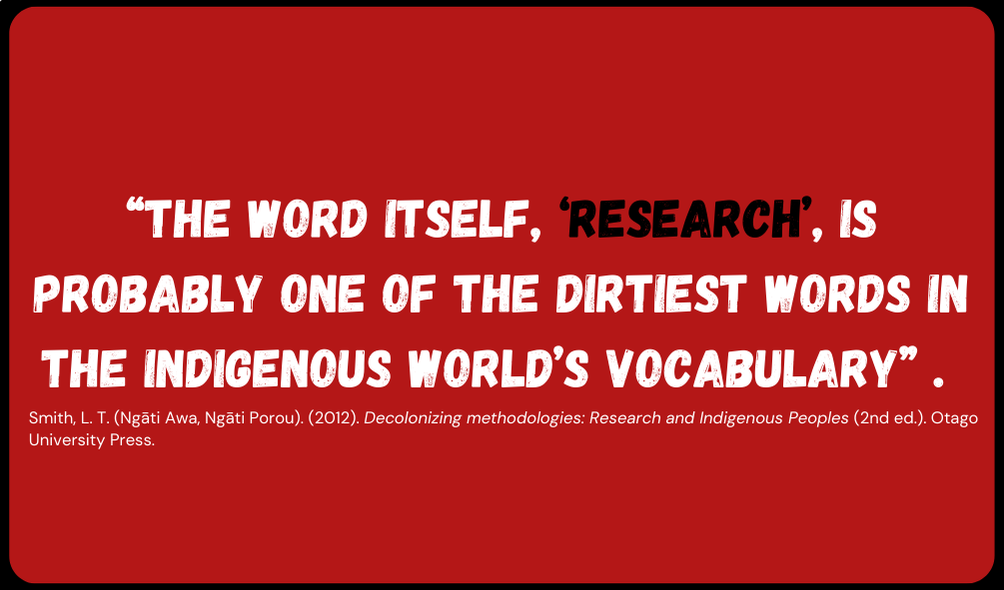Nau mai, haere mai

This guide is designed to support and expand upon best practices and methodologies for conducting research on Indigenous Peoples and communities, as well as for Indigenous researchers themselves. It is not intended to be a standalone resource; rather, it should be used in conjunction with our broader guides and materials on finding and referencing academic sources.
For researchers who are not Indigenous but are engaging with Indigenous topics or populations, this guide offers critical insights into the importance of Indigenous perspectives and values within research practices. Understanding the cultural, historical, and social contexts of Indigenous knowledge is essential for ensuring respectful, ethical, and effective engagement with Indigenous communities and their respective intellectual traditions.
Our curated Subject Guides are a great place to get started. Check these out here:
A good place to start
Decolonizing Methodologies- Linda Tuhiwai Smith (Ngāti Awa, Ngāti Porou, and Tūhourangi)
This volume explores intersections of imperialism and research - specifically, the ways in which imperialism is embedded in disciplines of knowledge and tradition as 'regimes of truth.' Concepts such as 'discovery' and 'claiming' are discussed and an argument presented that the decolonization of research methods will help to reclaim control over indigenous ways of knowing and being.

Decolonizing research: Indigenous storywork as methodology- Various Indigenous authors
Decolonizing Research brings together indigenous researchers and activists from Canada, Australia and New Zealand to assert the unique value of indigenous storywork as a focus of research, and to develop methodologies that rectify the colonial attitudes inherent in much past and current scholarship. By bringing together their own indigenous perspectives, and by treating indigenous storywork on its own terms, the contributors illuminate valuable new avenues for research, and show how such reworked scholarship can contribute to the movement for indigenous rights and self-determination.

Becoming Tangata Tiriti: Working with Maori, honouring the Treaty- Avril Bell (Pākehā)
Becoming Tangata Tiriti brings together twelve non-Māori voices – dedicated professionals, activists and everyday individuals – who have engaged with te ao Māori and have attempted to bring te Tiriti to life in their work. In stories of missteps, hard-earned victories and journeys through the complexities of cross-cultural relationships, Becoming Tangata Tiriti is a book of lessons learned.
Critical conversations in Kaupapa Māori- Various authors
This collection furthers knowledge about Kaupapa Māori by examining its effects over the decades, identifying and discussing its conventions and boundaries and reflecting on Kaupapa Māori in social and educational research and practice.
Colonising myths, Māori realities: He rukuruku whakaaro- Ani Mikaere (Ngāti Raukawa, Ngāti Porou)
This book brings together a series of papers that reflects on the effect of Pākehā law, legal processes, and teaching on Māori legal thought and practice.
Maori Philosophy: Indigenous thinking from Aotearoa- Georgina Tuari Stewart (Ngāpuhi, Ngāti Kahu, Ngāti Maru)
Covering the symbolic systems and worldviews of the Indigenous Peoples of Aotearoa, New Zealand, this book is a concise introduction to Māori philosophy. It addresses core philosophical issues including Māori notions of the self, the world, epistemology, the form in which Māori philosophy is conveyed, and whether or not Māori philosophy has a teleological agenda.
Ngāpuhi speaks
The hearing of the Ngāpuhi Nui Tonu initial claim required the Waitangi Tribunal to look into the Ngāpuhi and Crown understandings of He Wakaputanga - often referred to as the Declaration of Independence - and Te Tiriti o Waitangi. This independent report considers the evidence presented to the Tribunal and, in particular, the assertion by Ngāphui Nui Tonu that in assenting to Te Tiriti they did not cede their sovereignty to the Crown
Here to help
The Teaching and Learning Team can help you with:
- Finding quality resources
- Navigating the Library's databases
- Referencing the sources used
Teaching and Learning Librarians:
Kate Reynolds, Krista Yuen, Dadon Rowell, Elsie Langdon, Matt Silvester, Ngāwaiata Henderson.
Contact us
Book a Consultation
Click the links above to book a consultation with your subject support librarian. Choose where and how you want to meet.
